What is a smart contract, and how does it work?
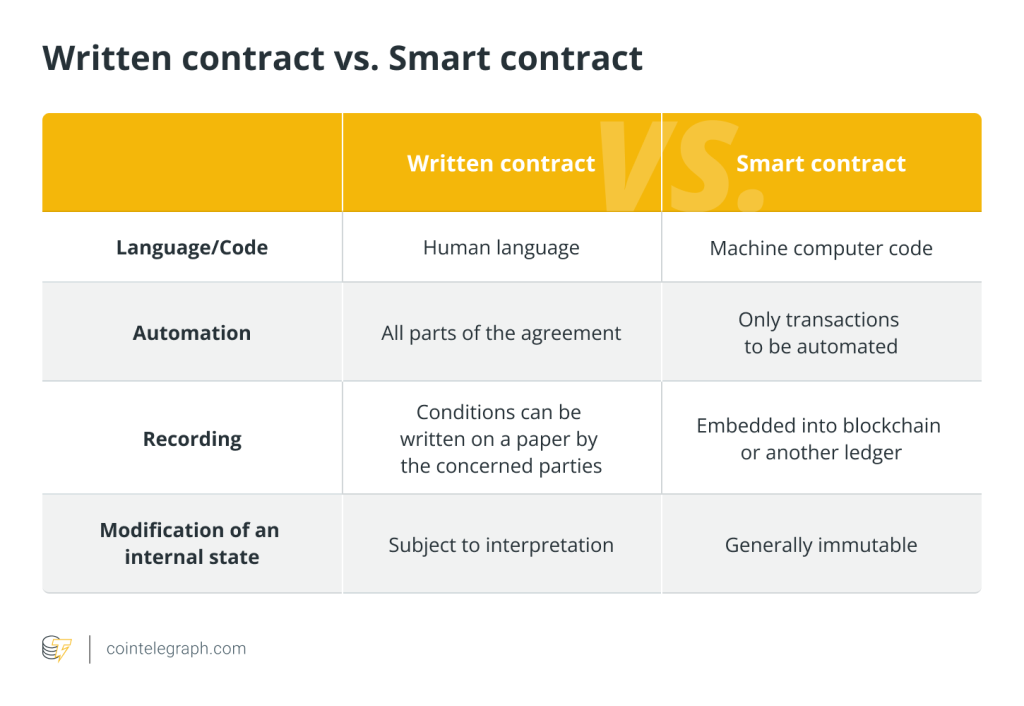

What is a smart contract?
Smart contracts are contracts that are coded and stored on the blockchain. They automate agreements between the creator and recipient, making them immutable and irreversible. Their primary purpose is to automate the execution of an agreement without intermediaries, ensuring that all parties can confirm the conclusion instantly. Additionally, they can be programmed to initiate a workflow based on specific circumstances.
So, what is an executed contract? An executed contract in terms of a smart contract refers to the successful completion of the agreement programmed into the smart contract. Once all the conditions specified in the code of the smart contract are met and the required actions are performed, the contract is considered executed. Popularized by the Ethereum blockchain, smart contracts have led to the network’s array of decentralized applications (DApps) and other use cases.
One key benefit of blockchain networks is the automation of tasks that traditionally require a third-party intermediary. For example, instead of needing a bank to approve a fund transfer from a client to a freelancer, the process can happen automatically thanks to a smart contract. This reduces the time and cost involved in traditional contract execution.
Another example could be decentralized arbitration via smart contracts, which is a process by which disputes between parties are resolved without the need for a traditional legal system or centralized arbitration authority.
The smart contract would then be deployed on a blockchain network. In the event of a disagreement, the smart contract would receive evidence and arguments from both parties. The arbitration would then be carried out automatically via the smart contract, either using a predetermined list of arbitrators specified by both parties or a decentralized network of arbitrators.
Once a decision is reached, the smart contract would automatically execute the decision, such as transferring funds to the winning party or releasing the product or service to the appropriate party.
This article will explain the history of smart contracts, how smart contracts work, and why smart contracts are important.
How do smart contracts work?
Think smart contracts as digital “if-then” statements between two (or more) parties. If one group’s needs are met, then the agreement can be honored, and the contract is considered complete.
Let’s say a market asks a farmer for 100 ears of corn. The former will lock funds into a smart contract that can then be approved when the latter delivers. When the farmer delivers their obligation, the funds will immediately be released — i.e., after fulfillment of a legal contract. However, the contract is canceled and funds are reversed to the client if the farmer misses their deadline.
Of course, the above is a small use case. Smart contracts can be programmed to work for the masses, replacing governmental mandates in retail dealings, among other benefits. Moreover, smart contracts would potentially remove the need for bringing certain disagreements into court, saving parties both time and money.
This security is largely due to the underlying smart contract code. On Ethereum, for instance, contracts are written in its Solidity programming language, which is Turing-complete. This means that the rules and limitations of smart contracts are built into the network’s code, and no bad actor can manipulate such rules. Ideally, these limitations would mitigate scams or hidden contract alterations.
Unlike most blockchain networks, which are described as a distributed ledger, Ethereum is what’s considered a distributed state machine, containing what’s known as the Ethereum Virtual Machine (EVM). This machine state, of which all Ethereum nodes agree to keep a copy, stores smart contract code and the rules by which these contracts must abide. Since every node has the rules baked in via code, all Ethereum smart contracts have the same limitations.
In more technical terms, the idea of a smart contract can be broken down into a few steps, as discussed below:

Identify parties and establish the terms of the agreement
Identifying the parties involved and coming to an agreement on the contract’s terms and conditions is the first stage in creating a smart contract. The terms of the contract, the obligations of each party and the standards for contract execution are all described in this agreement.
Define the conditions for contract execution
The second step is to specify the conditions that must be met for the contract to be executed. These conditions are typically expressed as a set of rules or criteria that must be satisfied for the contract to be considered valid.
Write the smart contract code
The third step is to write the code for the smart contract. The code will specify the exact steps that need to be taken to execute the contract when the specified conditions are met.
Deploy the contract to a blockchain platform
Deploying the smart contract on a blockchain platform is the fourth stage. This entails validating the contract’s validity by uploading the code to the blockchain network.
Trigger the contract execution automatically
The smart contract’s execution is the fifth phase. When the predetermined circumstances are satisfied, the contract is automatically executed, and the blockchain network activates it.
Record the contract’s details on the blockchain ledger
The contract’s information is entered onto the blockchain network when it gets executed. This covers the terms of the contract, the prerequisites for execution, and the execution date and time. The contract’s specifics are immutable once they are entered into the blockchain ledger, meaning they cannot be changed or removed.
It is also important to note that smart contracts are different from written contracts in many ways, as discussed in the table below:

Historical background of smart contracts
Believe it or not, smart contracts long predate blockchain technology. While Ethereum, introduced in 2014, is the most popular implementation of the protocol, cryptographer Nick Szabo established the idea in the 1990s.
Back then, Szabo conceptualized a digital currency called Bit Gold. While the asset was never actually launched, this Bitcoin (BTC) predecessor highlighted the smart contract use case — trustless transactions on the internet.
However, smart contracts didn’t start to get much attention until the advent of blockchain technology in the late 2000s. Blockchain technology made it possible to build decentralized, trustworthy networks that don’t require a centralized authority to carry out smart contracts. Ethereum was the first blockchain platform to allow smart contracts.
Many, including the Ethereum website, compare smart contracts to a vending machine. Vending machines serve the purpose of a vendor providing the user with a product, without the need for an actual person to take the money and hand over the item. Smart contracts serve that same purpose — but are much more versatile.
Smart contracts have advanced quite a bit over time. They started as simple if-then statements that a programmer can create and implement. Now, they have been used for a variety of applications, including supply chain management, real estate transactions and even voting systems. The potential for smart contracts to revolutionize the way business is conducted and people interact with each other is vast, and their development is an exciting area of innovation in the blockchain space.
Benefits of smart contracts
Smart contract blockchains provide various benefits, including speed, efficiency, accuracy, trust, transparency, security and savings, as discussed in the sections below.
Smart contracts leverage computer protocols to automate actions, streamlining various commercial processes and saving valuable time. By eliminating the need for intermediaries such as brokers to validate signed legal contracts, the risk of third-party manipulation is significantly reduced.
The absence of intermediaries in smart contracts not only mitigates risk but also translates into cost savings. With complete visibility and access to the terms and conditions of the contract, all relevant parties are held accountable once the agreement is signed. This ensures that the transaction is transparent and non-negotiable, promoting trust and accountability among all involved parties.
Moreover, all documents kept on the blockchain are duplicated many times, allowing for the restoration of originals in the event of data loss. Smart contracts are encrypted, and cryptography protects all documents from being tampered with. Finally, smart contracts also eliminate errors that occur due to the manual filling out of several forms.
What are the main challenges faced by smart contracts?
Although smart contracts are a promising innovation, they are not without their flaws. It’s essential to remember that these contracts and the underlying blockchain technology are developed by humans, making them susceptible to human error. In some cases, errors in the code can result in security breaches, as was seen in the infamous attack on Ethereum’s decentralized autonomous organization (DAO) in 2016. The attackers exploited a vulnerability in the fundraising smart contract and diverted funds from the project.
Moreover, the lack of regulatory clarity surrounding smart contracts presents another challenge. While the idea of a secure, efficient transfer of funds is appealing, issues such as taxation and government oversight must be addressed. While users may desire complete control over their data, it’s crucial to consider how government agencies can access the information they require.
The inability of smart contracts to retrieve data from sources outside of the blockchain network is one of their drawbacks. This presents a problem because numerous real-world applications need external data to initiate or carry out contract clauses. For instance, external weather data might be required by a smart contract that bases insurance payouts on weather conditions.
This is where oracles come in. Oracles are third-party services that let smart contracts communicate with off-chain data sources, such as APIs and web pages. They provide a bridge between the smart contract and the external data source, supplying the details required to carry out the requirements of the contract.
As blockchain technology and smart contract usage grow, concerns about scalability and network congestion persist. This can affect the performance and reliability of the system, especially during periods of high usage. Moreover, smart contracts are self-executing and non-negotiable, which may be a drawback if the terms of the contract need to be changed because of unanticipated events.
Smart contract use cases and applications
Aside from the payments example mentioned above, there are various, potential implementations of smart contracts that can automate the world and make it an easier place to live. Here are some prominent examples of smart contract use cases.
Digital identity
On the internet, information is currency. Companies profit off of knowing everyone’s interests, and people are not always in control of how that data is acquired, nor do they profit from it. With smart contracts, people are in control.
In a blockchain-based future, identities will be tokenized. Ideally, this would mean each person’s identity exists on a blockchain, safe and secure from any bad actors. Now, if a user wants to participate on social media or submit documents to a bank for loan purposes, they can profit from the former and control the transaction process in the latter.
For social media, no intermediary controls a network. Instead, users choose what information to make public and what to keep private. Should they want to participate in information exchange, like an endorsement, they can create a smart contract and choose what data is transacted, rather than simply gleaning everything about a user. A third party isn’t there to take some of the funds or secretly store and sell that data — only the user profits.
The same applies when it comes to dealing with banks and other financial institutions. Communication only involves sending required documents and vital information over. There’s no risk of a loan group storing your email address and selling it to other credit companies. That info is entirely under the user’s control.
Real estate
In the traditional world, real estate brokers are a necessary evil. Considering the act of selling a house is nothing short of long and convoluted, owners will hire a broker to manage the confusing parts for them, such as the paperwork and finding a buyer. While that sounds ideal for the seller, remember that brokers take a significant fee from the house’s sale price.
A smart contract can take the place of a broker, streamlining the house transfer process while ensuring it’s just as secure as with an intermediary. This is where the “trustless” moniker comes into play.
Imagine the deed to your house is tokenized on the Ethereum blockchain. If you’re ready to sell it, you’d create a smart contract with the buyer. That contract would hold the deed in escrow until the buyer’s funds are properly submitted. That said, everyone wins. The seller saves money, as they don’t have to pay an intermediary, and the buyer gets the house much sooner than they would have otherwise.
Insurance
Insurance policies could easily benefit from smart contracts. Essentially, signing up for a policy would enter the user into a smart contract with a provider. All policy requirements would be written into the smart contract, which the user would read and sign if they agree.
That contract would sit open until the liable party needs it. Then, they’d simply upload the required forms that prove their need for insurance payment and the funds would be released. This type of contract removes the need for communicating with insurance groups and individuals. While the user would still need paperwork to prove their requirements, the subsequent submission and funding process will be close to instant.
In the identity aspect of things, it’s worth keeping in mind that all drivers will have a record of their accident reports and other important insurance information as well. This accessibility could factor into lower rates for good drivers with no dings on their driving history.
Supply chain
Arguably, one of the most popular implementations of blockchain technology and smart contracts, in particular, is within a supply chain.
Grocery stores, office warehouses, farmers and more all have their specific place in a supply chain. But with how complex these networks are becoming, companies are finding it increasingly harder to track product custody and follow payments, among other things. Smart contracts can automate and incentivize all parts of the supply chain to increase their accountability.
Suppose a company in Europe wants to purchase a shipment of goods from a supplier in Asia.
It could automate every step of the transaction, from ordering to delivery, using a smart contract. All pertinent information, such as the product specifications, shipping information, terms of payment and deadlines for the fulfillment, would be included in the smart contract.
In order to guarantee that the items are in accordance with the buyer’s expectations, the smart contract would also include conditions for the product’s quality and quantity. The use of intermediaries, like banks or brokers, and the fees associated with them would be unnecessary because the contract is self-executing and non-negotiable.
The money would be kept in escrow once the contract is signed until the supplier certifies that the products have been delivered. The blockchain would track and save the delivery schedules and shipment information, giving both parties complete visibility and transparency.
When the goods are delivered and the buyer certifies that they meet the agreed-upon parameters, the smart contract will instantly release the payments to the provider. Due to the lack of intermediaries and decreased risk of fraud, this method would be effective, efficient and secure.
Does Bitcoin have smart contracts?
The Taproot upgrade is a significant achievement for Bitcoin’s smart contract capabilities. It solves the scalability issue by enabling the network to handle multiple signatories and their complex transactions without the risk of clogging. With Taproot, Bitcoin’s base chain can host smart contracts, empowering the network to execute more sophisticated transactions.
In addition, Bitcoin can support smart contracts on protocols, such as the Lightning Network, which relies on multisignature transactions called hashed time-locked contracts (HTLCs). HTLCs facilitate low-cost and instant Bitcoin micropayments and ensure that parties involved in routing payments receive a small fee without compromising the security of the funds.
Can smart contracts be created without coding?
Yes, it is possible to create smart contracts without coding by using various smart contract development platforms that provide user-friendly interfaces and templates. These platforms provide drag-and-drop user interfaces and visual editors that enable users to quickly and simply develop smart contracts without the need for programming expertise.
For instance, Ethereum Studio, a web-based integrated development environment (IDE), provides templates for creating smart contracts using Solidity, Ethereum’s programming language. It offers a drag-and-drop interface, making it easy for users to create smart contracts without coding. An IDE is a software application that provides a comprehensive set of tools and features for developers to write, test and debug code efficiently.
BlockApps Strato, a blockchain platform that offers a visual editor for creating smart contracts, is another example of a no-code smart contract platform. It supports a number of computer languages, such as Solidity and JavaScript, and offers users a variety of template options.
The future of smart contracts
Smart requirements-powered contracts are undoubtedly the way forward for relatively basic contracts that can be written and executed automatically whenever pre-conditions are met, such as residential conveyancing, where completion monies can be given as soon as contracts are signed.
Various smart contract platforms will save businesses worldwide time and money while also revolutionizing how they interact in the supply chain and with their customers. As a result, minimal human involvement will free individuals and important decision-makers from dealing with mundane administration and red tape, allowing them to focus on their day jobs. It is because the smart contract picks up the slack.
Smart contracts are already being used by many banks and insurance organizations in their daily operations. As a result, smart contracts are already here and being tested in real-world scenarios, and it won’t be long until they become a part of our everyday lives and routines. Regardless of the preceding argument, there is still a long way to go until everything is governed by a smart contract, if ever.


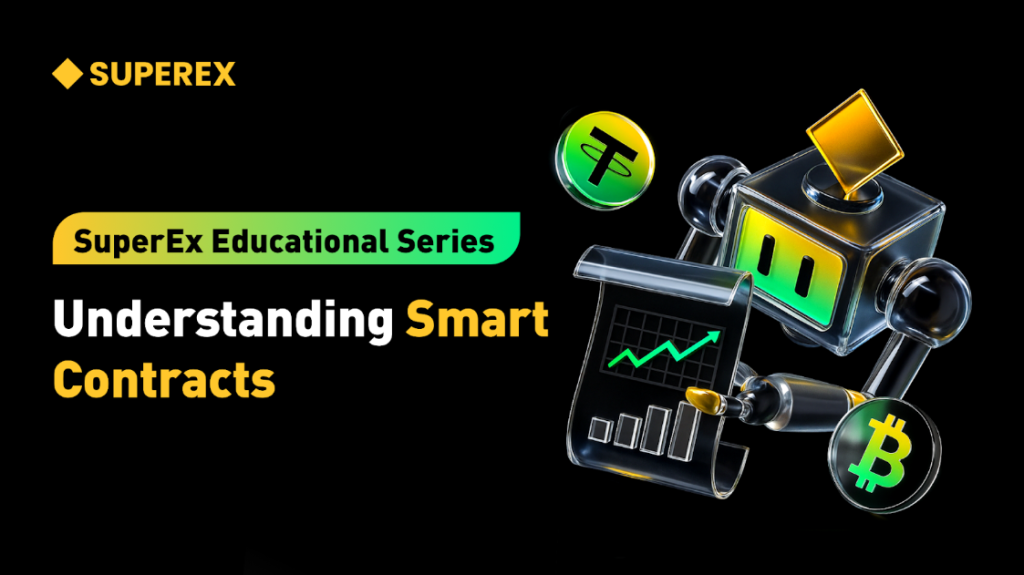
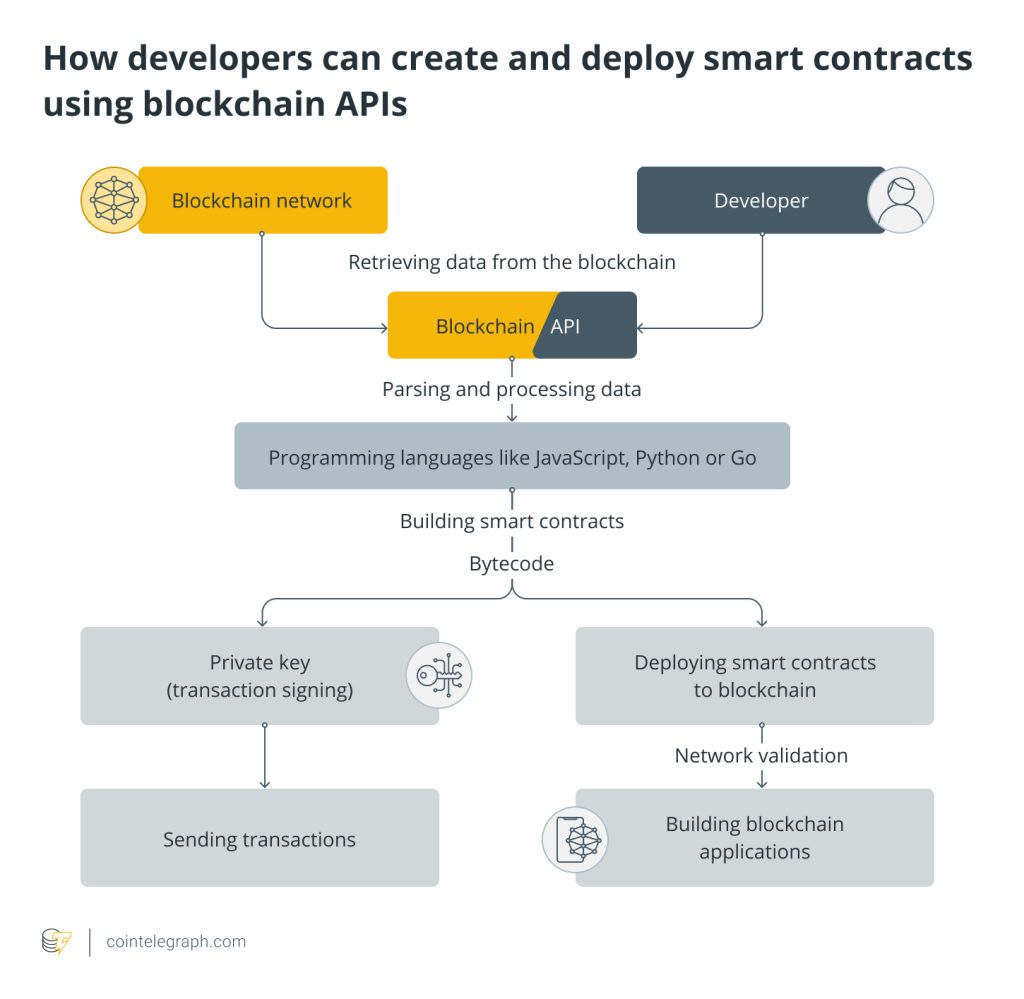
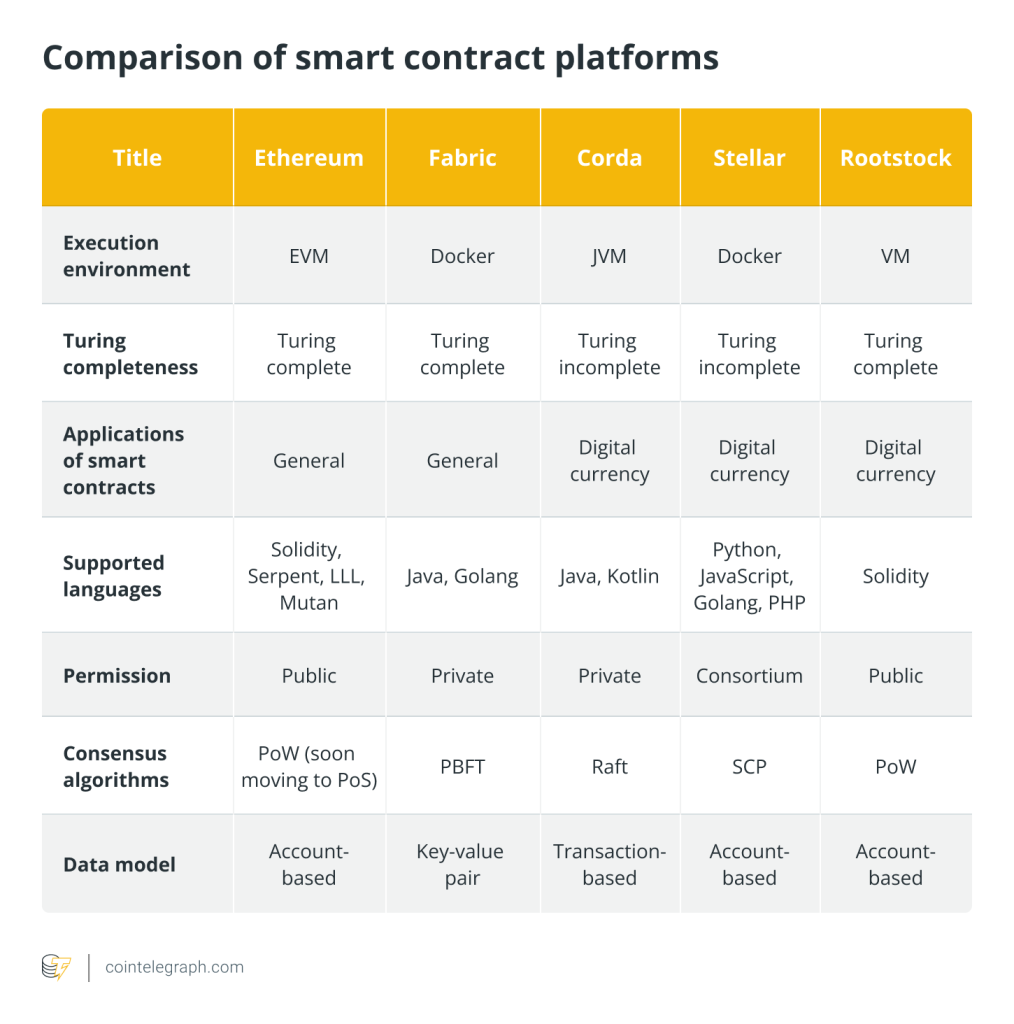
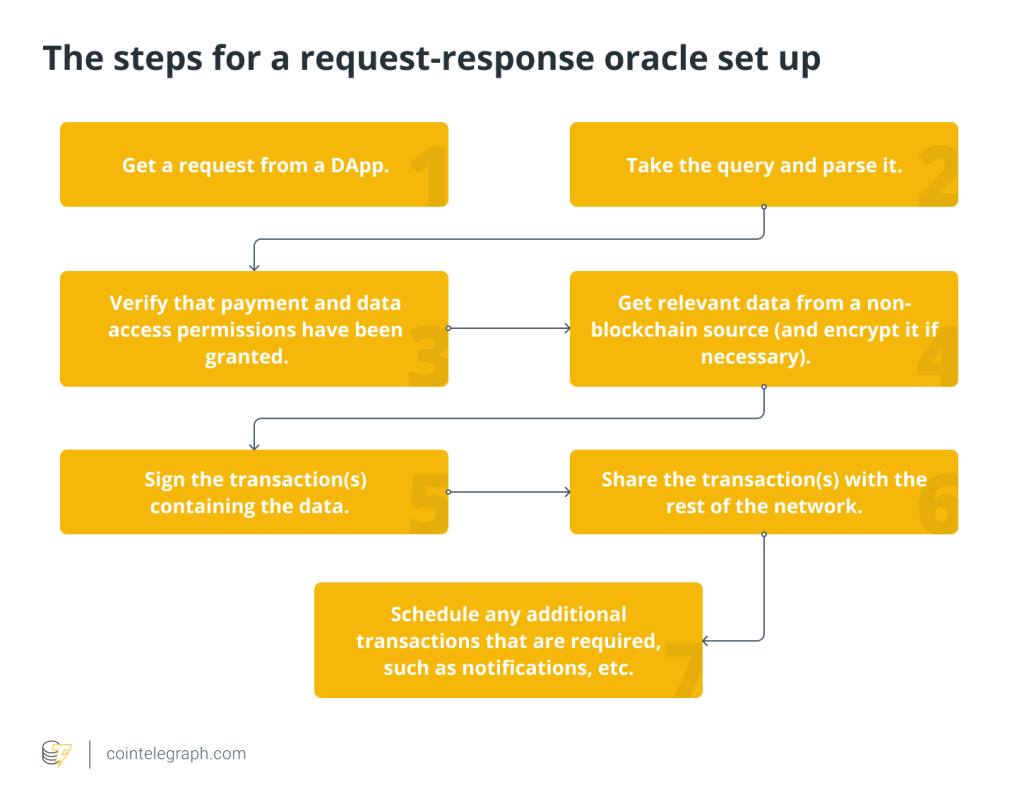
… [Trackback]
[…] Find More to that Topic: x.superex.com/academys/beginner/2902/ […]
… [Trackback]
[…] Information to that Topic: x.superex.com/academys/beginner/2902/ […]
… [Trackback]
[…] Here you will find 71893 more Information to that Topic: x.superex.com/academys/beginner/2902/ […]
… [Trackback]
[…] Here you will find 58188 more Info to that Topic: x.superex.com/academys/beginner/2902/ […]
… [Trackback]
[…] Read More to that Topic: x.superex.com/academys/beginner/2902/ […]
… [Trackback]
[…] Info to that Topic: x.superex.com/academys/beginner/2902/ […]
… [Trackback]
[…] Info to that Topic: x.superex.com/academys/beginner/2902/ […]
… [Trackback]
[…] Find More Info here to that Topic: x.superex.com/academys/beginner/2902/ […]
… [Trackback]
[…] Find More Information here on that Topic: x.superex.com/academys/beginner/2902/ […]
… [Trackback]
[…] Info to that Topic: x.superex.com/academys/beginner/2902/ […]
… [Trackback]
[…] Here you will find 67389 more Info on that Topic: x.superex.com/academys/beginner/2902/ […]
… [Trackback]
[…] Find More on that Topic: x.superex.com/academys/beginner/2902/ […]
… [Trackback]
[…] Information on that Topic: x.superex.com/academys/beginner/2902/ […]
… [Trackback]
[…] Read More Information here to that Topic: x.superex.com/academys/beginner/2902/ […]
… [Trackback]
[…] Read More Info here on that Topic: x.superex.com/academys/beginner/2902/ […]
… [Trackback]
[…] Find More here on that Topic: x.superex.com/academys/beginner/2902/ […]
… [Trackback]
[…] Here you will find 54995 more Info to that Topic: x.superex.com/academys/beginner/2902/ […]
… [Trackback]
[…] Read More to that Topic: x.superex.com/academys/beginner/2902/ […]
… [Trackback]
[…] Here you can find 93256 more Info on that Topic: x.superex.com/academys/beginner/2902/ […]
… [Trackback]
[…] Info to that Topic: x.superex.com/academys/beginner/2902/ […]
… [Trackback]
[…] Information to that Topic: x.superex.com/academys/beginner/2902/ […]
… [Trackback]
[…] Find More to that Topic: x.superex.com/academys/beginner/2902/ […]